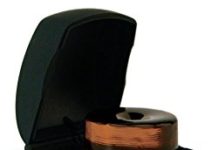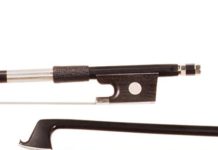







You’ve likely come here because you are looking for new cello strings. Whether you just want to try out new cello strings, are new to buying cello strings, or you just want to make sure that the cello strings you use are still the best cello strings you can get for your price, you’ve come to the right place.
Cello strings are an expensive investment, especially when you have to buy new ones every six months to a year, but the right strings can make your cello sing. Below we’ve listed what we consider the best cello strings that you can find, but not every cello string will sound the same on your instrument as on other cellos. You should try out several cello strings brands to make sure you pick the best ones for your cello.
Best Cello Strings
| Strings | Recommended For | Price for Set |
| 1. Evah Pirazzi Gold/Regular | Intermediate/Expert | $344.47 |
| 2. Larsen | Intermediate/Expert | $309.70 |
| 3. Dominant by Thomastik-Infeld | Beginner/Intermediate | $149.39 |
| 4. Pirastro Passione | Expert | $329.99 |
| 5. Spirocore Strings by Thomastik-Infeld | Beginner/Intermediate | $121.46 |
| 6. Prelude | Beginner | |
| 7. Pirastro – Obligato | Intermediate/Expert | $325.00 |
| 8. Jargar | Intermediate | $127.90 |
| 9. Helicore | Beginner | $159.99 |
| 10. Merano | Beginner |
Best Cello String Combinations
Cellists often mix and match different cello string brands in order to get the best sound. Instead of buying full string sets, you can find individual strings on Amazon, such as the Larsen A string, to save money and not waste strings.
The typical cello string combination includes Larsen A, Larsen D, Spirocore Tungsten G, and Spirocore Tungsten C. Get it here.
| A String | D String | G String | C String | Get Combo |
| Jargar | Jargar | Spirocore Tungsten | Spirocore Tungsten | Buy |
| Larsen Solo | Larsen Solo | Spirocore Tungsten | Spirocore Tungsten | Buy |
| Larsen Solo | Chromcor | Chromcor | Spirocore Tungsten | Buy |
| Larsen Solo | Larsen Solo | Spirocore silver | Spirocore silver | Buy |
| Evah Pirazzi | Evah Pirazzi | Helicore | Helicore | Buy |
Best Cello String
Evah Pirazzi cello strings have a complex and warm tone combined with excellent projection and dynamic responsiveness. Great for intermediate and advanced cellists alike.
Features:
- Excellent projection
- Warm tone
- Dynamic responsiveness
Best Cello String for Beginners
Dominants are affordable, have great sound, and are quite durable. Great for students of all levels, but especially beginners.
Features:
- Synthetic perlon (nylon) core
- Affordable
- Great sound
Table of Contents
What Makes a Great Cello String?
Every brand of cello string is unique and some will sound better on your cello compared to others. While we have some favorites as you can see from this article, not every one of the top-rated cello strings will sound the best on your cello.
The same cello strings may not sound as good on all strings. Some strings sound better on the A and D strings while others have a better tone on the G and C strings. Many cellists prefer to combine sets of cello strings and Amazon even sells some of these combinations so that you don’t need to waste strings. We highlight some of the most common cello strings combinations in our “Popular Cello String Combinations” section above. This list should give you a good idea about which cello string brands tend to work well together.
Make sure it’s in your budget
While we do recommend trying different brands of cello strings, experimenting can get pretty expensive, so we recommend evaluating your budget for cello strings and adjusting accordingly. Even so, if you are a serious player you will want to find the right fit for your instrument and playing style. One potential solution to find the right string is buying a different brand each time you need to replace your strings and over the next few years, you’ll figure out which ones work for your cello.
Get the right gauge/thickness
This is one factor that will take you some time to determine what’s best for your cello. Cello strings have different diameters (gauges) which change their sound and tone. The same strings may sound completely different on different cellos depending on the shape, craftsmanship, wood, etc. In general, thicker strings sound better because they provide a fuller, richer sound.
Check the material of the string
The material that the cello is made from does impact the sound as well. Modern strings are made from synthetic material which is then wrapped in metal coil or solid metal. This makes them cheaper and more durable than other types of cello strings, especially gut strings.
With so many cello string options on the market, you might have trouble sifting through all of the options to find the best cello strings. In this article, we’ll walk through our favorite cello strings, but we recommend that you try brands of cello strings to find the ones that make your cello sound the best.
What Strings Do Famous Cellists Prefer?
Yo-Yo Ma tends to use the Jargar A and D combined with a Spirocore silver G and C on his Montagnana cello. Wendy Warner and Alisa Weilerstein also use this combination. Wendy also uses Larsen A and D strings with the Spirocore G and C on here 20th century cello.
Amit Peled has a 1733 Matteo Gofriller cello that works well with the Evah Pirazzi (our favorite cello string). He likes the Evah Pirazzi A because it doesn’t sound nasally in the higher range.
Steven Isserlis prefers gut strings: Pirastro Oliv C string and the Eudoxa range, also by Pirastro, for the A, D and G.
1. Evah Pirazzi Gold/Regular – Overall Best Cello String
Recommended For: Intermediate/Expert
Here at Orchestra Central, we love Evah Pirazzi cello strings because they generally have a complex and warm tone combined with excellent projection and dynamic responsiveness. This combination is not very common amongst cello strings which is why we have rated the Evah Pirazzi’s as our #1 recommendation again.
Loved by amateurs and virtuosos alike, the Evah Pirazzi strings get our highest approval rating. Watch out though: full sets of Evah Pirazzi cello strings usually sell for over $200.
Evah Pirazzi cello strings come in three quality levels: Regular, Soloist, and Gold. For the intermediate cello student, we suggest getting the cost-effective Regular Evah Pirazzi cello strings. The Soloist line is intended for performers who typically solo and this string level provides brilliance for solo performances. Finally, the Gold Evah Pirazzi cello strings are intended for intermediate to advanced players who want a brilliant and complex sound.
2. Larsen Cello Strings – Beautiful Tone
Recommended For: Intermediate/Expert
Larsen strings are common for intermediate and advanced players because their complex and powerful tones are able to rival those of the Pirazzi Gold cello strings, yet they are more affordable.
Larsen cello strings are a great option for intermediate to expert players. As with Jargar cello strings, Larsens can be paired with any range of other strings. A popular combination includes pairing Larsen D and A-strings with Thomastik-Infeld Spirocore or Dominant C and G-strings.
3. Dominant by Thomastik-Infeld – Great All-Around Cello String
Recommended For: Beginner/Intermediate
Dominants are a favorite amongst string players, especially violin and viola players. They’re affordable, have great sound, and are quite durable. Dominant strings come in many gauges and sizes, so it’s easy to find cello strings to fit your cello.
Dominants were the first cello strings made with a synthetic perlon (nylon) core making them pinoeers in the industry. Other nylon cello strings are build according to the standard that Thomastik-Infeld set.
4. Pirastro Passione
Recommended For: Expert
Pirastro developed the Passione cello strings to cater to advanced players who want to play with gut strings. The G and C strings are gut while the A and D strings are steel which produces huge projection and tone on the lower range balanced with a smooth transition to the upper range.
The gut core is manufactured and wound in aluminum by hand so you can be sure that these strings are of the utmost quality. The downside to these strings is the lack of stability, as with many gut strings, but the Passione strings are able to mostly remedy this issue.
5. Spirocore by Thomastik-Infeld
Recommended For: Beginner/Intermediate
Another favorite by Thomastik-Infeld, Spirocores are very responsive sound, making them popular among amateurs and professionals alike. The strings help pronounce the lower tones of the cello, so they make great G and C strings. In fact, the single C-string pairs quite well with other cello string sets.
6. Prelude
Recommended For: Beginner
Prelude strings are the ideal beginner string since they cost less than $30 and provide a stable sound that suffices for any new student. These are good enough for at least the first year or two of playing, but after that, you’ll want to upgrade to a better set of strings.
7. Pirastro – Obligato
Recommended For: Intermediate/Expert
The Obligato are brighter than the Evah Pirazzis which makes them great additions to the upper-half of your cello. The D, G, and C strings contain the same synthetic core as the Pirazzis but are more affordable so they are a great alternative. The A-string has a chromesteel core. The downside is that Obligatos can sometimes break sooner than other cello strings on this list meaning you’ll need to replace them more frequently. These are medium-guage strings.
8. Jargar
Recommended For: Intermediate
Jargar strings have become the most interchangeable cello strings and are often used in cello string combinations. In fact, Yo-Yo Ma uses the Jargar A and D combined with a Spirocore silver G and C on his Montagnana cello. The strings have a steel core which makes them brilliant and responsive. The G and C strings provide a warm depth due to their silver windings. Jargards come in multiple gauges.
9. Helicore
Recommended For: Beginner
Helicore makes great cello strings for beginners. They are both affordable and sound good, a rare combination for strings. Over the last few years, they have been gaining a reputation in pop music. They perform better than Preludes, so are a great option if you can afford them. Helicore strings only come in medium gauge.
10. Merano
Recommended For: Beginner
Merano cello strings are the cheapest cello strings you can find (usually less than $20 for a full set of cello strings). They are ok strings for students just starting out but will need to be upgraded relatively quickly due to their lack of longevity and sound quality.
Merano strings are bright and edgy in tone, making them great for popular and folk styles of playing. They are also great additions to an electric cello where string quality is not as big of a factor.
How Much Do Cello Strings Cost?
Typically cello strings have to be replaced at least once a year and can cost upwards of $200 on average for a full string set. You can find some beginner strings for less than $100 for a full set, but these strings won’t last long and don’t sound great. For example, the Merano strings on this list cost just $17. Price does typically reflect sound quality for cello strings so more expensive cello strings generally sound better regardless of the cello.
Cello strings are expensive, there’s no way around it. It’s important to find a balance between sound and price while searching for the perfect cello strings.
How Are Cello Strings Made?
Historically, cello strings were made from gut, typically dried out sheep or goat intestines. Modern strings are wound with metallic materials like aluminum, titanium, and chromium with synthetic (nylon) or steel cores. Most cello strings are machine-wound, but some, like the Passione strings below, are hand-wound.
How to Change Your Cello Strings?
If it’s your first time changing cello strings, we recommend asking your teacher for assistance since it can be challenging to do until you’ve got the hang of it. If you’re sure that you can handle it, follow these steps:
- Make sure the cello strings are the right length. If you have a smaller cello and are using 4/4 cello size strings, you will need to trim them. Here’s guidance from Fretless Finger Guides about how long your cello strings should be.
4/4 Cello = 695mm = 27 3/8 inches
3/4 Cello = 635mm = 25 inches
1/2 Cello = 600mm = 23½ inches
1/4 Cello = 535mm = 21 inches
1/8 Cello = 490mm = 19¼ inches - Gently place the cello on its back. You may want to put a towel or soft cloth behind it.
- Start with the A string. Loosen it until you are able to remove the string from the peg. Remove the other end from the tailpiece or fine tuner. Make sure that the bridge remains in place.
- Get the new string ready. While the peg is out, you may want to apply peg dope to the peg if you are having issues turning it.
- Thread the ball-end of the new string into the fine tuner or tailpiece. Thread the other end into the peg and begin turning the peg to tighten it.
- Repeat with the other strings. You should do the C string next, followed by the D and G. This will make sure that there is enough pressure on the bridge so that the soundpost doesn’t fall over.
To make sure you are doing it right, you can follow along with this video by D’Addario.
Conclusion
Finding great cello strings can be a challenge since there are so many options on the market to choose from. We hope this overview has helped you decide on which cello strings you should try next. If you’re still looking for more help with buying accessories for your cello, check out our buying a cello checklist.



















